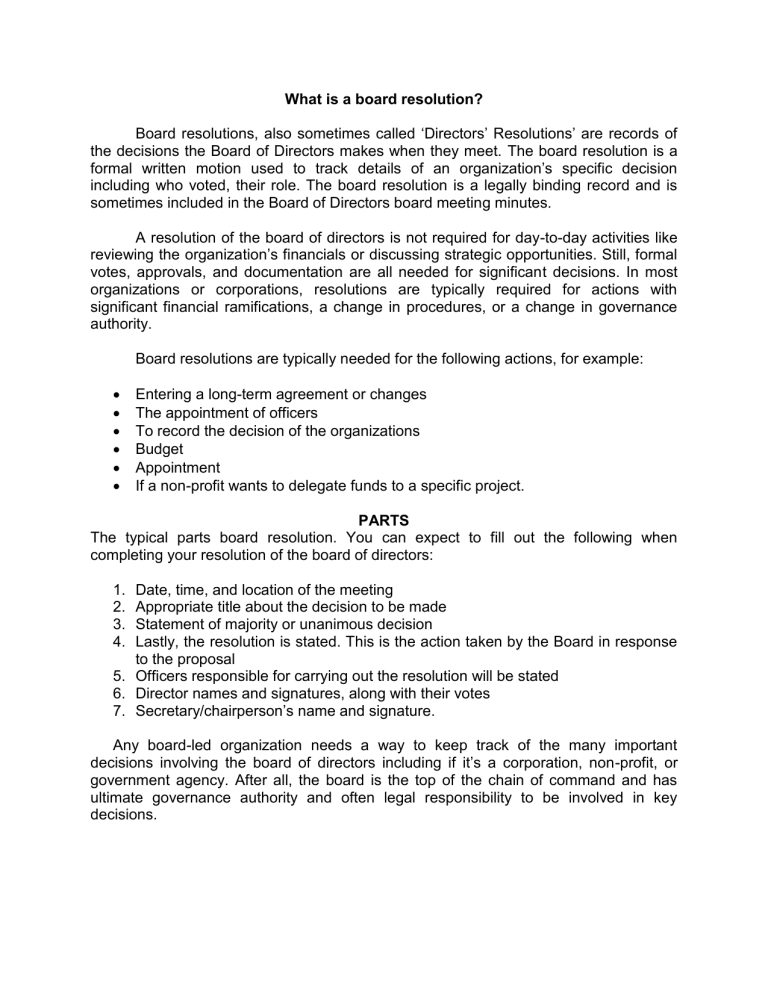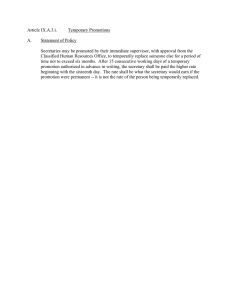
What is a board resolution? Board resolutions, also sometimes called ‘Directors’ Resolutions’ are records of the decisions the Board of Directors makes when they meet. The board resolution is a formal written motion used to track details of an organization’s specific decision including who voted, their role. The board resolution is a legally binding record and is sometimes included in the Board of Directors board meeting minutes. A resolution of the board of directors is not required for day-to-day activities like reviewing the organization’s financials or discussing strategic opportunities. Still, formal votes, approvals, and documentation are all needed for significant decisions. In most organizations or corporations, resolutions are typically required for actions with significant financial ramifications, a change in procedures, or a change in governance authority. Board resolutions are typically needed for the following actions, for example: Entering a long-term agreement or changes The appointment of officers To record the decision of the organizations Budget Appointment If a non-profit wants to delegate funds to a specific project. PARTS The typical parts board resolution. You can expect to fill out the following when completing your resolution of the board of directors: 1. 2. 3. 4. Date, time, and location of the meeting Appropriate title about the decision to be made Statement of majority or unanimous decision Lastly, the resolution is stated. This is the action taken by the Board in response to the proposal 5. Officers responsible for carrying out the resolution will be stated 6. Director names and signatures, along with their votes 7. Secretary/chairperson’s name and signature. Any board-led organization needs a way to keep track of the many important decisions involving the board of directors including if it’s a corporation, non-profit, or government agency. After all, the board is the top of the chain of command and has ultimate governance authority and often legal responsibility to be involved in key decisions. WHAT IS A SECRETARY A secretary is an administrative professional who plays an integral role in business and other organizational environments. Secretaries are typically the individuals who maintain and organize office tasks, implement procedures and carry out additional administrative duties, depending on the nature of their employment. Secretaries rely on a diverse set of skills to help them succeed in their jobs. Oftentimes, secretaries may be the individuals responsible for keeping office administration and operations running smoothly. Secretary duties and responsibilities A secretary's duties can vary depending on where they work, and sometimes secretaries exceed their job requirements. 1. Answering and directing phone calls 2. Organizing and distributing messages 3. Maintaining company schedules 4. Organizing documents and files 5. Greeting business clients and guests 6. Documenting financial information 7. Maintaining and ordering office supplies 8. Scheduling meetings and conferences 9. Assisting executives with project tasks 10. Supervising staff and new employees 11. Coordinating with other organizations 12. Implementing administrative procedures Secretaries might also play a role in developing and implementing company policies and various administrative procedures. For example, a medical secretary may develop a procedure for documenting patient treatment plans that includes following a set of steps to document medical information in a database. The secretary might then implement this new procedure by training nurses and staff on how to carry out the directives of the policy. Because secretaries can take on a variety of different tasks and responsibilities, it can be crucial for secretaries to possess a wide range of skills like administrative skills, communication skills, customer service skills, technical skills, analytical and problemsolving skills. Secretaries may also rely on leadership skills to organize and direct office staff and procedures.
![August 20, 1986 SG/94/86 D-08 From: The Secretary General [*] To](http://s3.studylib.net/store/data/007822023_2-1a5272e9a5af1caa9930908b70495ac3-300x300.png)



